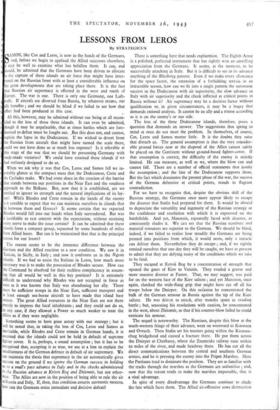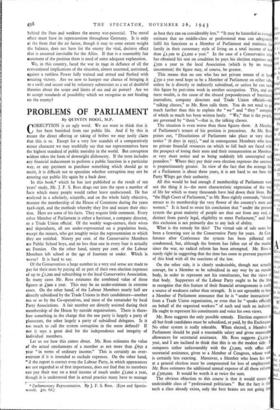LESSONS FROM. LEROS
By STRATEGICUS AMOS, like Cos and Leros, is now in the hands of the Germans, and, before we begin to applaud the Allied successes elsewhere, may be well to examine what has befallen them. It can, and hould, be admitted that the Germans have been driven to allocate o the capture of these islands an air force that might have inter- ned on the Russian front with at least a considerable influence on he great developments that are taking place there. It is the fact that Russian air supremacy is effected in the west and south of urope. The war is one. There is only one Germany, one Luft- affe. If aircraft are diverted from Russia, by whatever means, our lly benefits ; and we should be blind if we failed to see how that ffect had been produced in this case.
All this, however, may be admitted without our being at all recon- iled to the loss of these three islands. It can even be admitted, i though it may be, unpalatable, that at times battles which are fore- ' loomed to defeat must be fought out. But this does not, and cannot, explain the lapse in the Dodecanese. If we wished to divert from the Russian front aircraft that might have turned the scale there, could we not have done so at much less expense? Is it tolerable at this stage of the war that we should be presenting Germany with ready-made victories? We could have retained these islands if we had seriously designed to' do so.
When we ask why it was that Cos, Leros and Samos fell we in- evitably glance at the compact mass that the Dodecanese, Crete and the Cyclades make. We had some share in the creation of the barrier that stands between our positions in the Near East and the southern approach to the Balkans. But, now that it is established, are we entitled to ignore its strength and the natural implications of its lay- out? While Rhodes and Crete remain in the hands of the enemy is it sensible to expect that we can maintain ourselves in islands that lie between them and Greece? It seems certain that we expected Rhodes would fall into our hands when Italy surrendered. But was It justifiable to rest content with the expectation, without straining every nerve to make the issue certain? It can be admitted that these islands form a compact group, separated by some hundreds of miles from Allied bases. But can it be maintained that that is the principal reason for our losses?
The reason seems to be the immense difference . between the German and the Allied reaction to a new condition. We saw it in Tunisia, in Sicily, in Italy ; and now it confronts us in the N.gean islands. If we had to assist the Italians in Leros, how much more necessary was it to make the possession of Rhodes secure. How can the Command be absolved for their reckless complacency in assum- ing that all would be 'well in this key position? It is extremely difficult to understand why Rhodes was not occupied in force as soon as it was known that Italy was abandoning her ally. There must be sufficient troops in the Near East, sufficient transport and at least enough sea-borne aircraft to have made that island base secure. The great Allied resources in the Near East are not there merely to impress the local inhabitants ; and they could not do so, in any case, if they allowed a Power so much weaker to treat the Allies as if they were negligible.
Something seems to have gone astray -with our strategy ; but it will be noted that, in taking the loss of Cos, Leros and Samos as inevitable, while Rhodes and Crete remain in German hands, it is assumed that the islands could not be held in default of supreme fighter cover. It is, perhaps, a sound assumption ; but it has to be recognised that, accepting it as true, we are at a loss to explain the steadfastness of the German defence in default of air supremacy. We Can maintain the thesis that supremacy in the air automatically gives success on the ground if we ignore the German success in holding us to a snail's pace advance in Italy and in the checks administered to the Russian advance at Krivoi Rog and Zhitomir, but not other- wise. The Allies are now in the position of being able to rule the air at Russia and Italy, If, then, that condition assures automatic success, how can the Germans resist immediate and decisive defeat?
There is something here that needs explanation. The Eighth Army is a polished, perfected instrument that has rightly won an unwilling appreciation from the Germans. It seems, at the moment, to be
successfully attacking in Italy. But it is difficult to see in its advance anything of the Blitzkrieg pattern. Even if we make every allowance
for the space factor, the extension of a forbidding terrain in an intractable season, how can we fit into a single pattern the automatic success in the Dodecanese with air superiority, the slow advance in Italy with air superiority and the check inflicted at critical points in Russia without it? Air supremacy may be a decisive factor without qualification or, in given circumstances, it may be a bogey that demands rational analysis. It cannot be an ally and a traitor according as it is on the enemy's or our side.
The loss of the three Dodecanese islands, therefore, poses a question that demands an answer. The suggestions that spring to mind at once do not meet the problem. In themselves, of course, Cos, Leros and Samos matter little. It is the doubts they raise that disturb us. The general assumption is that the very consider- able ground forces now at the disposal of the Allies cannot safely be placed on the Continent without ground-based fighter-cover. If that assumption is correct, the difficulty of the enemy is strictly limited. He can measure, as well as we, where the blow can and cannot fall. There are a number of official statements that justify the assumption ; and the fate of the Dodecanese supports them. But the fact which dominates the present phase of the war, the success of the German defensive at critical points, stands in flagrant contradiction.
For we have to recognise that, despite the obvious skill of the Russian strategy, the Germans once more appear likely to escape the disaster that Stalin had prepared for them. It would be absurd to depreciate the versatility and ingenuity of the Russian strategy or the confidence and resolution with which it is expressed on the battlefields. And. yet, Manstein, repeatedly faced with disaster, as consistently eludes it. We can see that the Russian numbers and material resources are superior to the German. We should be blind, indeed, if we failed to realise how steadily the Germans are being penned into positions from which, it would seem, only a miracle can deliver them. Nevertheless they do escape ; and, if we rightly remind ourselves that one day they will be caught, we have at present to admit that they are defying many of the conditions which we take to be fatal.
They escaped at Krivoi Rog by a concentration of strength that opened the gates of Kiev to Vatutin. They evaded a graver and more massive disaster at Fastov. That, we may suggest, was paid for on the western face of the Kiev salient ; and yet Manstein, once again, checked the wide-flung grip that might have cut off all his troops below the Dnieper. On this occasion he concentrated the bulk of the German armour in Russia against the tip of the Kiev salient. He was driven to attack, after months spent in evading battle ; but, seasoning his resolutions with caution, he concentrated in the west, about Zhitomir, so that if his counter-blow failed he could extricate his armour.
The sequel is noteworthy. The Russians, despite this blow at the south-western fringe of their advance, went on westward to Korosten and Ovruch. Then Stalin set his tractors going within the Kremen- chug bridgehead and caused a fracture there. He put them across the Dnieper at Cherkassy, where the Znamenka railway runs within 20 miles of the river, and made headway there. He has cut all the direct communications between the central and southern German armies, and he is pressing the enemy into the Pripet Marshes. Here the Partisans tend to dominate the position. They are as familiar with the tracks through the marshes as the Germans are unfamiliar ; and, now that the season tends to make the marshes impassable, that is a vital advantage.
In spite of every disadvantage the Germans continue to elude the fate which faces them. The Allied air-offensive sows destruction behind the lines and weakens the enemy war-potential. The moral effect must have its repercussions throughout Germany. It is only at the front that the air factor, though it may to some extent weight the balance, does not have for the enemy the vital, decisive effect that is assumed inevitable for the Allies. If that is a reasonably fair statement of the position there is need of some adequate explanation.
We, in this country, faced the war in 194o in defiance of all the conventional implications of the situation, almost unarmed, untrained, against a ruthless Power fully trained and armed and flushed with amazing victory. Are we now to hamper our chance of bringing it to a swift and secure end by voluntary submission to a set of doubtful theories about the scope and limits of sea and air power? Are we to accept standards of possibility which we recognise as not binding on the enemy?



























 Previous page
Previous page